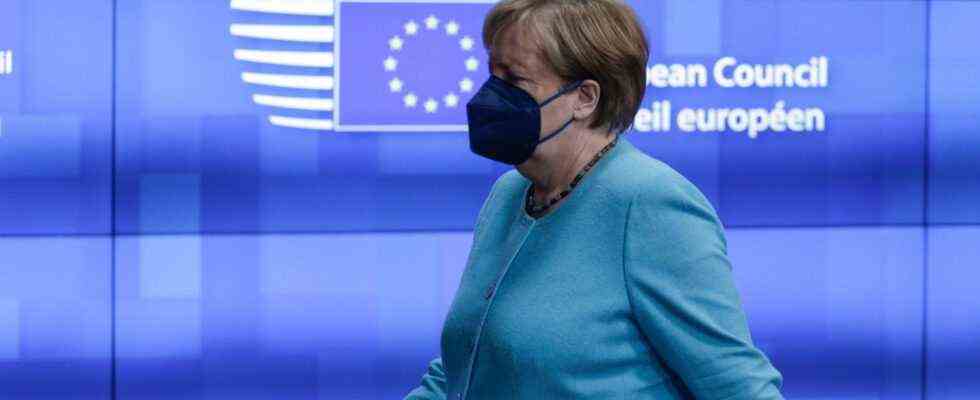Status: 09/26/2021 4:14 a.m.
Merkel is the longest-serving EU head of government – and the number one crisis manager in unstable times. Europeans have very different hopes for their successor.
There are laws of nature in physics, they describe regularities in the behavior of real systems. A Merkelian law of nature would be that the most powerful woman in Europe has been managing one crisis after another for 16 years – provided that this has reached an inevitable urgency.
HP em Who comes to Merkel-_SEG.mxf
European magazine 12:45 p.m., September 26, 2021
If the euro fails, Europe fails.
Merkel’s fate was revealed with her statement in the euro crisis in 2010: At that time, she tipped the scales, trying to unite German and European interests. Money for the affected countries: Yes, but only with tough austerity measures. Thereupon there were allegations from their own party. Anger against Merkel and her European austerity policy rose not only in Greece. For some she was too little European, for others too little German interest representative.
From refugee summer to “Fortress Europe”
We make it.
Five years later: the so-called refugee crisis. Millions of people seeking protection came to Europe. Merkel’s saying, a small sentence, became the program – also in Brussels. But today there is still no single European solution for migration. Instead, some human rights are being undermined at the EU’s external borders, and critics speak of a “fortress Europe”.
Merkel’s unresolved crisis
What matters to me is that we pulled ourselves together in the end.
Another five years later: the corona crisis. In the last few meters, Merkel made a U-turn in July 2020: She spoke out in favor of shared debts and, after days of negotiations, also convinced the others of it.
The fact that Merkel is an administrator of the status quo has consequences. “In my opinion, with all the achievements, the Chancellor has played a key role in ensuring that the rule of law crisis in the EU has continued to advance,” says political scientist Jana Puglierin. Merkel did not set limits to Hungary and Poland early enough and decidedly enough.
Orbán’s hope for “Merkel 2.0”
While the Hungarian Prime Minister Viktor Orbán is dismantling the freedom of the press and the rule of law in his country and a similar picture is being revealed in Poland and other Eastern European countries, Merkel seems to be paying little attention to this crisis.
The Hungarian journalist Katalin Halmai is certain: Viktor Orbán would like it to stay that way. “But Hungarian civil society expects a serious change in Germany’s course in terms of the rule of law, democracy and behavior towards Poland and Hungary,” she says.
There it goes: Merkel visiting Orbans in Berlin. Merkel seemed to have little interest in the erosion of the rule of law in Poland and Hungary.
Image: CLEMENS BILAN / EPA-EFE / REX / Shutte
Netherlands expect “German frugality”
When it came to money, Germany always enjoyed great trust in the EU – but the corona pandemic and also the climate crisis are making calls for a paradigm shift louder. Common Debt for the European Recovery Fund? No thank you. Austria, Sweden, Denmark and above all the Netherlands opposed this as the “thrifty four”.
The Dutch government hopes for a thrifty Germany in the future, too, says journalist Clara van de Weil: “Germany has always been an ally of the Netherlands when it comes to enforcing a strict budget. The Dutch expect that – whoever her successor will show this German frugality. “
On European policy, the Dutch Prime Minister Mark Rutte and Chancellor Merkel largely agreed.
Italy hopes that Berlin will be willing to cooperate
Italy, on the other hand, is hoping for German generosity, says Italian journalist Lorenzo Robustelli. Especially when it comes to the economy, investments and the granting of loans: “Italy expects the new German government to support the restructuring of the fiscal rules in Europe – which are more or less suspended because of the corona crisis.” Although he trusts the Italian Prime Minister Mario Draghi to negotiate about it – but he also needs a Germany that can make concessions.
Changes made little progress with Merkel. That must now change, believes political scientist Jana Puglierin: We need bolder visions, more leadership from the front and clearer announcements. Because no matter who follows Merkel – the tasks at European level are enormous.
The optimism of the longest-serving EU head of government could perhaps be gleaned from there: “I promise you, once we have come to an agreement, I’ll be more talkative,” she said at the special meeting of the EU Council on February 21, 2020 which was about the multiannual financial framework. “In this respect, we are united by the principle of hope.”
You can find out more about this on Sunday, September 26th, 2021 in the “Europamagazin” at 12.45 pm in the first.

